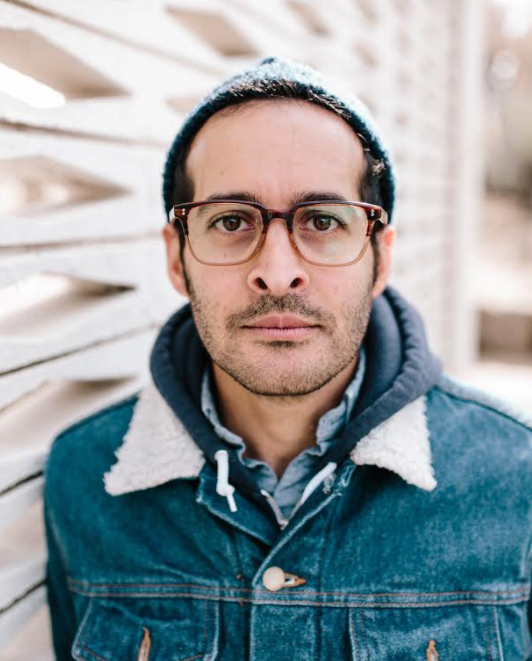It was out in the orchard that we met the man in the white suit. His jacket was folded next to him. He had an apple with him even though the trees were thick with plums. He had a knife. Was lifting slices of apple to his mouth with its blade. His hands were lighter than ours but dirty. He saw me looking at them. Smiled and gave both me and brother slices, said There’s a lot of dirt under my nails. All the unripe fruit that falls out of the trees, it’s my job to bury them. Get paid for every piece. So I watch the bluejays, for when they alight upon the branches. And I send my blackbirds––I have a flock of blackbirds––into the trees, and the birds thrash their bodies against each other amongst the leaves, and the dark but unripe plums tumble towards the earth, before they might fall on their own. I get paid for every piece. Would you boys like a job? I’ve gathered so many blackbirds that sometimes I need help. As well as help to gather and bury the fruit. You boys wanna help. I can pay you a nickel a plum, it adds up. We nodded, and at dusk returned to the same tree. We heard a whistling. And then footsteps through the grass. And then the man in the white suit walked up.
In the orchard, the man in white sends his blackbirds into the trees and they shake the trees loose of whatever from their bodies is not held too tight. The plums rain down and we feel the wind made by their bodies passing before the thuds of them hitting the soft ground. Quick the man yells. Quick! It’s best to bury them before they touch the earth, makes it easier! Me and brother run to catch the plums. The sun is far gone now, and it’s hard to see in the dark. But our eyes are young and sharp. We run with our arms out. The not yet ripe bodies our embraces collect are so dark––even inside the night that has now arrived, we can see this. And far larger than any fruit we have touched. And in the light that arrives from the stars, tiny and silent above us, they look much like brother and me. It feels a little strange all this, but, we lift palmfuls of soil, and place the fruit into the holes. Some of the fruit, they. They struggle. Like, they sorta fight. Against being put in the holes. Which is weird but. It starts feeling weirder, when there are pieces that didn’t. And I swear they made sounds, mostly what seems a kinda whimpering. I could swear I heard a scream but brother says it was the blackbirds. Like I said it’s all a little strange but most of the strangeness passes. I just thought though that after we buried them, they would stop making sounds.
The man smiles, says good job. He’s eating a piece of fruit, I’m guessing a plum this time, the inside of it’s blacker than what an apple would be. I notice too his hands are cleaner than before. He calls his birds back in, like a fisherman pulling in nets, and keeps saying good job over and over. I don’t even know if he’s talking to us when he says it. One of the last ones we put in the ground, the man in white asked us to pause. He lifted the fruit back out, and sent us on to tend to the others. I heard him whisper, I don’t know if for our benefit or his or for nothing, I just want the thigh. Of the dark meat, the thigh is the softest part. He never tells us what he gets paid for each piece, never told us who pays him.

Ryan Longnecker
Anis Mojgani is the author of four books. His work has appeared on NPR, HBO, and in RATTLE, Thrush, Bat City Review, and The Berkeley Review. A two-time National Poetry Slam Individual Champion, winner of the international World Cup Poetry Slam, and multiple-time TEDx speaker, Anis has been awarded residencies from the Vermont Studio Center and AIR Serenbe. His most recent book, The Pocketknife Bible (WriteBloody Publishing, 2015), is an illustrated poetry memoir about growing up Black & Iranian in New Orleans. Anis currently lives in Portland, Oregon.

